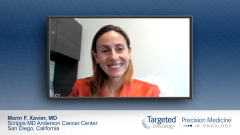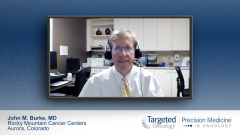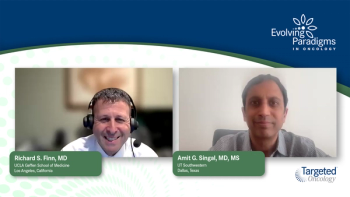
R/R DLBCL: Educating Patients About CAR T Cells
Suggestions to hematologist-oncologists when talking to patients with relapsed/refractory diffuse large B-cell lymphoma about the potential benefits of CAR T-cell therapy and toxicities.
Episodes in this series

Marin F. Xavier, MD: These are chimeric antigen receptor [CAR] T cells, and the most common of the 3. They’re all CD19, which is the important point. That’s why we raised these questions about sequencing with other targeted anti-CD19 therapies and the unknown questions. Yes, we have some data emerging about people going on to receive CD19 CAR T post-loncastuximab in the LOTIS registrational trial. They reported out a subset of those outcomes and then looked at tafasitamab before and after tafasitamab CAR T. From the toxicity scales to mitigation.
The 2 of us are not consenting our patients, but they’re coming back to us for guidance. They have this scary discussion, and they want us to tell them what to do. So we do need to know a little about the risks of the procedures. I’ve had probably a dozen or 2 that were on a lot of the trials, and BCMA [B-cell maturation antigen] and CAR T for myeloma. The neurotoxicity can be long-standing: long-standing cytopenias, long-standing B-cell depletion.
I talked to David Porter, who’s 1 of my mentors, from the University of Pennsylvania. Using CD19 for CLL [chronic lymphocytic leukemia], we’ve been doing initial studies at the University of Pennsylvania. Those patients are now over 10 years out, but a lot of them are still requiring IVIG [intravenous immune globulin]. There’s a cost to that potential cure. In my 75 year-olds who are very skittish, I say, “The stakes are high, but the outcome can be long-term remission and cure.” I do heavily push the youngsters, for sure. But those geriatric patients get in this category who are not fit enough for autotransplant but may be fit enough for CAR T. That’s a gray zone.
From a clinical perspective, let’s talk about that group. When they come back to you, are you enthusiastic about pushing them toward that, or do you say we have some other alternatives?
John M. Burke, MD: You’re talking about the group, post? Which group again?
Marin F. Xavier, MD: The group of patients who relapse who are not fit enough for autotransplant but are considered fit enough for cellular therapy. That’s where I struggle the most on pushing people toward cellular therapy when we have some very effective alternatives that we never had before.
John M. Burke, MD: Those are borderline and not that healthy. It’s tough. I’ve heard people who do a lot of CAR T-cell therapy treatment say almost no one is not a candidate for CAR T-cell therapy. I’ve heard different perspectives. Not being a CAR T-cell treater, I’m not the 1 who usually makes that decision. You made a really good point earlier. Community doctors have got to be able to talk to patients. You haven’t even sent them off yet and you find out they have a relapse. You’ve got to be able to tell them about some of the risks and benefits of CAR T-cell therapy and help them make a decision about the right thing to do. It is important to know a bit about cytokine release syndrome, and neurological toxicities. Talk your patients through a bit about how it works, just as you do about transplant, and share that with them. Then help them make a decision: is that consult something they want to do? As you said, it’s important to give as many patients as possible that option because it’s potentially curative therapy where previously we had no such thing, right? Third-line DLBCL, especially post-transplant, was a death sentence. Nowadays that’s not necessarily the case.
Transcript edited for clarity.


















